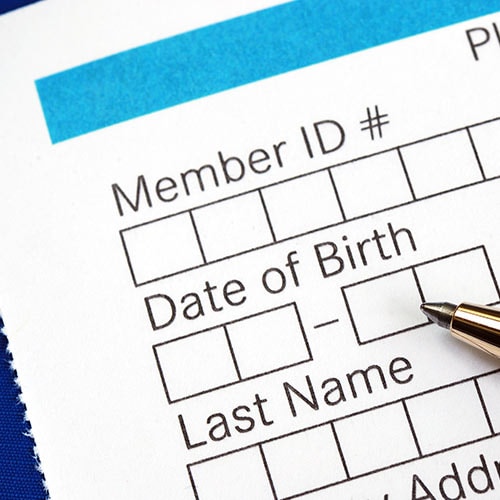Are you worried about a criminal stealing your identity? You should be, and here’s why.
If criminals steal your personal or financial information they could take out loans or open credit card accounts in your name. They might be able to access your online bank or credit card accounts. They might even sign up for expensive medical care in your name, getting the treatment but sending you the bill.
You do have options, though, to help protect yourself against identity theft, most notably credit monitoring and identity theft protection services.
What's the difference? Here’s what you need to know.
Credit monitoring vs. ID theft protection
Credit monitoring is a basic service in which you receive alerts whenever a company notices suspicious activity on your credit reports.
Identity theft protection services, though, not only monitor your credit reports, but also look for fraudulent purchases or activity with your online bank or credit card accounts. Some even scour the dark web looking for criminals selling such information as your Social Security number, bank account information, birthdate or address.
What service is best for you — credit monitoring or an ID theft protection service? That depends on whether you are willing to spend for the peace of mind that comes with more intense protection against identity theft.
What is identity theft?
When criminals steal your identity, they are actually stealing your personal or financial information. They then use this information to take out credit card accounts or loans in your name, reaping the financial benefits from them and sticking you with the bill.
Identity thieves might also falsely file a tax return in your name, hoping to snag your income tax return. They might use your information to break into your credit card account to run up thousands of dollars in purchases. They might access your online bank account and use the funds in it to rack up online buys.
It’s important, then, to know quickly when thieves have stolen your identity. It’s best to catch identity theft quickly, before criminals can do too much financial damage.
Credit monitoring and identity theft protection services are two tools you can use to spot the signs of identity theft.
Do-it-yourself credit monitoring
If you don’t want to spend any money, you can monitor your credit on your own. That’s because you can order copies of your three credit reports — one each maintained by the national credit bureaus of Experian, TransUnion and Equifax — at no charge from AnnualCreditReport.com.
Before the COVID-19 pandemic, you were allowed to order one free report from each bureau once a year. During the pandemic, that policy was changed to allow for a free report from each bureau once every week, which makes it easier to monitor your credit on your own. And as of October 2023, that pandemic-era benefit was made permanent.
Your credit reports will list your open credit card accounts and loans. It will also list whether you have any late or missed payments on these accounts during the last seven years. Study your reports carefully for credit card accounts and loans that you don’t remember taking out. These are a sure sign that someone has stolen your identity.
You can also check your online bank and credit card accounts regularly, looking for suspicious transactions or withdrawals. If you see these, a criminal might have stolen the information they need to log into your accounts.
If you do find suspicious activity on either your bank or credit card accounts or credit reports, call the bank, lender, or credit card provider behind these financial accounts immediately. You want to cancel all credit cards that thieves have accessed and alert your bank that someone might be illegally withdrawing money from your account. You’ll also want lenders to know that fraudulent loans taken out in your name aren’t your responsibility.
Paid credit monitoring
If you don't have the time to monitor your own financial accounts, you can use a service that monitors your credit for you. This could be free or paid.
These services will monitor your credit reports for you, alerting you whenever a lender, bank or credit card provider checks your credit. These credit inquiries are a sign that someone — hopefully you — is applying for new credit or loans under your name. If you receive an alert for a credit card that you applied for, you're fine. If you instead receive one when you haven't applied for any credit cards? That's when you should be worried that a criminal is using your information to apply for a card in your name.
When shopping for a credit monitoring service, ask if the service tracks just one or all three of your credit reports. These credit reports track your applications for new credit, your payment history, and the amount of debt you've racked up. Each of your three credit reports might contain slightly different information because not all of the financial institutions you do business with necessarily report back to all three of the major bureaus.
Credit monitoring could alert you if a company checks your credit history or if a new credit card account or loan is opened in your name, according to the Federal Trade Commission.
Companies that suffer data breaches that expose their customers' information often provide credit monitoring as a free service to help victims monitor their credit reports. These credit monitoring plans can be offered for a year or two and may provide credit scores and/or reports from one or all three major credit bureaus.
Depending on who is affected by the breach, the free service can cover you or you and your dependent minor children. Read the details before signing up for any service to know exactly what you are getting.
Identity theft protection services
If you want more complete protection against identity, you can pay for an identity theft protection service.
While this service will monitor your credit reports, it could also search for your bank accounts, credit card accounts, and criminal databases for suspicious or fraudulent activity involving your personal and financial information.
These services might also help you recover from identity theft. An identity theft protection service may also alert consumers whose personal information is spotted on the dark web because an identity thief is selling it.
You may find that these services are available to you through your bank or insurance company, often for an additional fee, or you can work with an independent service.
If your identity is stolen, it could take months or even years to unravel the financial mess it creates. You can take steps on your own to fix it, or you can sign up for a service that offers identity theft credit repair.
If you are a victim of identity theft, you should file a police report and placing an initial fraud alert on your credit by contacting one of the three main credit reporting agencies. A fraud alert tells potential lenders to reach out to you directly to verify that you are actually applying for new loans or credit before opening new accounts in your name, according to the FTC.
Placing an initial fraud alert also entitles you to a free credit report from each of the three credit bureaus.
The FTC also recommends that you contact the credit reporting agencies directly to place a credit freeze on your credit files. When you freeze your credit, creditors cannot access your credit report, making it less likely an identity thief can open new accounts in your name. All three credit bureaus offer credit freezes for free. You will have to freeze your credit at all bureaus to ensure the most protection.
What to do if you are the victim of identity theft
If a criminal steals your identity, the Federal Trade Commission recommends that you take several steps to begin the recovery process:
- Call your credit card provider or bank if thieves have accessed these accounts. Call any lenders or credit card providers that thieves have contacted to open fraudulent accounts in your name.
- Place a fraud alert and obtain your credit reports. You can order free credit reports, to check for unauthorized loans or credit card accounts, from AnnualCreditReport.com.
- Notify the FTC. It’s important to report identity theft. Having this report can help you prove that your identity has been stolen if you need that information to dispute unauthorized charges or loans taken out in your name.
Credit monitoring vs. identity theft protection services
Here’s a breakdown of some of the similarities and differences of credit monitoring and identity theft protection services.
What credit monitoring offers:
- Credit report activity at one to three bureaus.
- Some services provide your three-digit credit score.
What identity theft protection services offer:
- Credit report activity at one to three bureaus.
- Court or arrest records in your name.
- Requests for change of your USPS mailing address.
- Orders in your name for new wireless, utility or phone services.
- Monitoring of the dark web and other sites in which criminals sell stolen information.
- Social media monitoring for mentions of your personally identifiable information.
What should you choose?
What makes more sense for you? Credit monitoring or identity theft protection services? That depends on how much protection you want from identity thieves.
Credit monitoring, either on your own or through a professional service, can alert you when suspicious activity shows up on your credit reports. But identity theft protection services take a more comprehensive approach to protecting your personal and financial information, often searching the dark web for thieves selling your information, monitoring your bank and credit card accounts and even scouring social media for mentions of your personal or financial information.
For the strongest protection, identity theft protection services are the better choice. For a more basic level of protection, monitoring your credit will boost your protection against identity thieves.
Editor’s note: Our articles provide educational information. LifeLock offerings may not cover or protect against every type of crime, fraud, or threat we write about.
This article contains

Monitoring your credit? It may not be enough protection against identity theft.
Start your protection,
enroll in minutes.
LifeLock is part of Gen – a global company with a family of trusted brands.
Copyright © 2026 Gen Digital Inc. All rights reserved. Gen trademarks or registered trademarks are property of Gen Digital Inc. or its affiliates. Firefox is a trademark of Mozilla Foundation. Android, Google Chrome, Google Play and the Google Play logo are trademarks of Google, LLC. Mac, iPhone, iPad, Apple and the Apple logo are trademarks of Apple Inc., registered in the U.S. and other countries. App Store is a service mark of Apple Inc. Alexa and all related logos are trademarks of Amazon.com, Inc. or its affiliates. Microsoft and the Window logo are trademarks of Microsoft Corporation in the U.S. and other countries. The Android robot is reproduced or modified from work created and shared by Google and used according to terms described in the Creative Commons 3.0 Attribution License. Other names may be trademarks of their respective owners.




